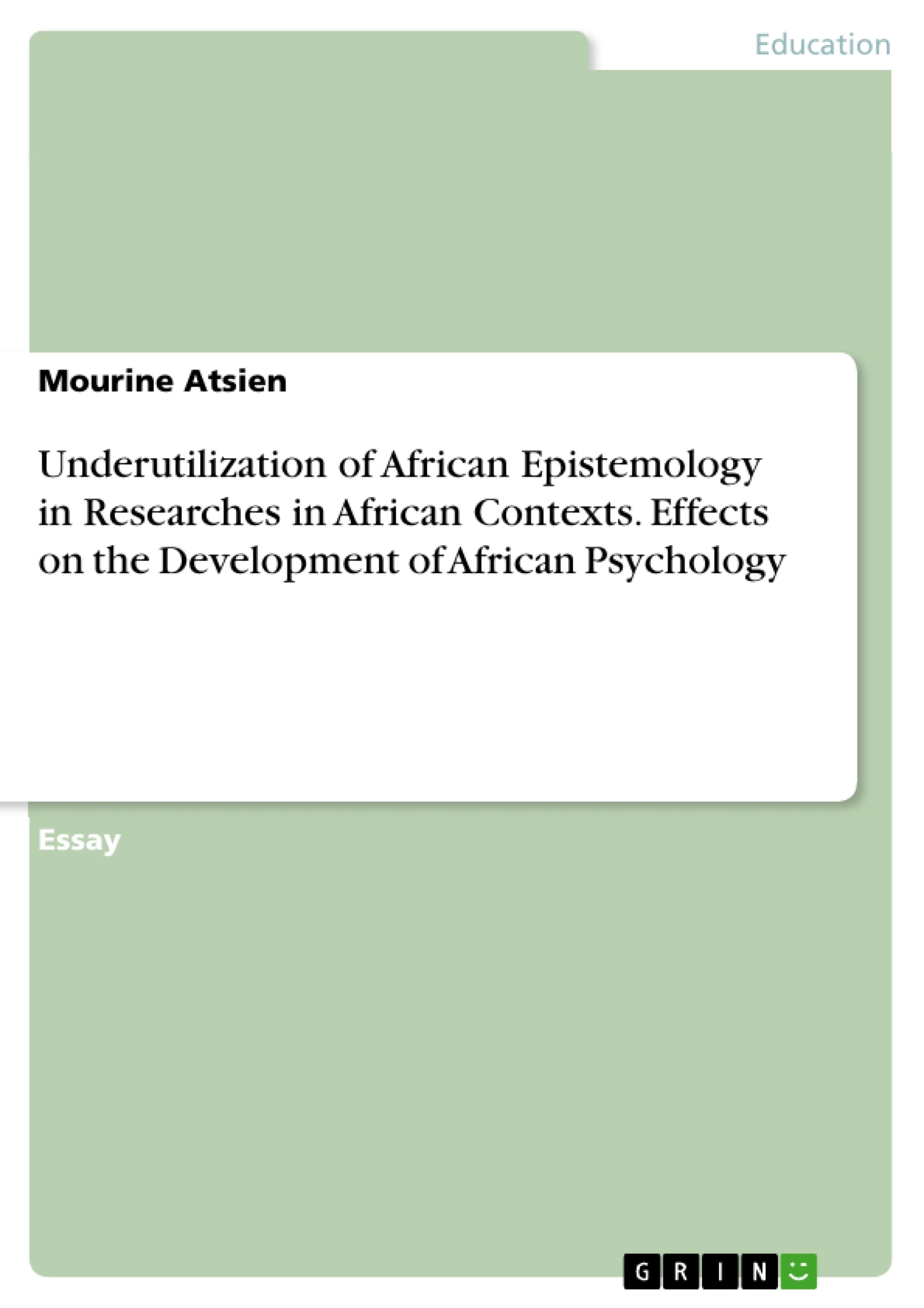Epistemology encompasses various processes of knowledge acquisition, development, and retention. Every culture has distinct methods of acquiring, sharing, and storing knowledge. However, many African societies have lost their conventional epistemology in favor of western epistemology in education and knowledge development within the continent. As such, the proposed study seeks to explore the underutilization of African epistemology in research in African contexts to draw possible implications for the development of African psychology in South Africa. It aims at narrowing the existing knowledge gap on the underutilization of African epistemology. To achieve the objective of the study, the researcher will follow the interpretivism research philosophy, explaining that reality is a social construction. In this regard, qualitative methods of data collection and analysis will be used to answer the research questions.
Inhaltsverzeichnis (Table of Contents)
- Abstract
- Introduction
- South African Context
- Research Questions
- Research Approach
- Rationale and Significance of the Study
Zielsetzung und Themenschwerpunkte (Objectives and Key Themes)
This research study seeks to explore the underutilization of African epistemology in research conducted within African contexts, specifically focusing on its implications for the development of African psychology in South Africa. The study aims to address the existing knowledge gap regarding the underutilization of African epistemology in research, drawing on the interpretivism research philosophy, which posits that reality is socially constructed.
- The significance of African epistemology for the development of African societies.
- The impact of colonialism, apartheid, and inter-ethnic conflicts on the neglect of African epistemology in South African Higher Education Institutions.
- The need for a more inclusive and culturally sensitive approach to psychological research and practice in African contexts.
- The importance of recognizing and integrating African epistemology into psychological research methodologies and practices.
- The potential contributions of African epistemology to the development of African psychology in South Africa.
Zusammenfassung der Kapitel (Chapter Summaries)
- Abstract: This chapter introduces the study's focus on exploring the underutilization of African epistemology in research within African contexts and its implications for African psychology development in South Africa. It outlines the study's objective, methodology, and potential contributions.
- Introduction: This chapter discusses the importance of epistemology in learning and teaching, highlighting the significance of African epistemology for the development of diverse African societies. It emphasizes the need to recover and acknowledge African knowledge systems and their potential impact on African psychology.
- South African Context: This chapter examines the specific context of South Africa, highlighting the growing demand for African epistemology in research within indigenous settings. It explores the historical factors that have contributed to the neglect of African epistemology in Higher Education Institutions and the need to address the gaps in understanding and application of African epistemology within psychological research.
- Research Questions: This chapter presents the research questions guiding the study, focusing on understanding how older adults in South African indigenous settings define and interpret African epistemology, the key factors of African epistemology in South African contexts, and the relevant contributions of African epistemology to the development of African psychology.
- Research Approach: This chapter details the study's qualitative research approach, chosen to gain in-depth insights into the study area and effectively address the research questions. It explains the rationale for using a qualitative approach, particularly in exploring older adults' perspectives on South African epistemology within their cultural and social environments.
- Rationale and Significance of the Study: This chapter discusses the motivations for conducting the study, highlighting the growing demand for utilizing African epistemology to address African problems. It emphasizes the need for increased research on African epistemology to promote and advance the African way of knowing and understanding realities in diverse African settings.
Schlüsselwörter (Keywords)
This study focuses on African epistemology, African psychology, South Africa, qualitative research, indigenous knowledge systems, cultural psychology, research methodologies, and decolonization of knowledge.
Frequently Asked Questions
What is African epistemology?
It refers to the distinct ways of acquiring, developing, and sharing knowledge within African cultures, often rooted in community and indigenous traditions.
Why is African epistemology underutilized in research?
Historical factors like colonialism and apartheid have favored Western epistemology in education and higher learning institutions, leading to a neglect of indigenous knowledge systems.
How does this neglect affect the development of African psychology?
It creates a knowledge gap where psychological research and practice may not fully address the culturally specific needs and perspectives of African societies.
What is the role of interpretivism in this study?
The research follows the interpretivism philosophy, which suggests that reality is a social construction, making qualitative methods essential for understanding cultural knowledge.
What is the significance of including older adults in this research?
Older adults in indigenous settings are often the primary keepers of traditional knowledge and can provide deep insights into the African way of knowing.
- Citation du texte
- Mourine Atsien (Auteur), 2022, Underutilization of African Epistemology in Researches in African Contexts. Effects on the Development of African Psychology, Munich, GRIN Verlag, https://www.grin.com/document/1326030



